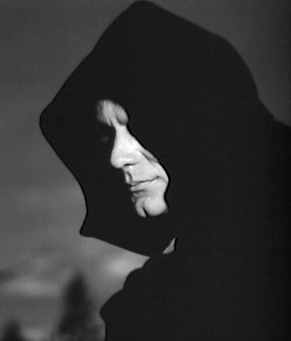I’ve just watched Ingmar Bergman’s classic film, The Seventh Seal. I went though a period a little while ago of buying DVDs on Amazon’s second hand shops, so they were cheap and allowed me to feel good about myself by having that sort of film collection.

Anyway, the film. First off, it’s beautifully filmed. Some of the scenes are iconic, foremost of which are, of course, the various shot of Death and the protagonist, Antonius Block, playing chess. Bergman said that the image of a knight playing chess with Death for his life come from a 1480s painting in the church at  Täby in Sweden. The image of death portrayed by Bengt Ekerod has also become a classic and echoes down, being picked up, I would say, as the Emperor in Star Wars and as Fear in the Star Trek: Voyager episode, The Thaw. I know that Star Trek is seen as being geeky, but I really don’t care – I will return to this in another post, though.
Täby in Sweden. The image of death portrayed by Bengt Ekerod has also become a classic and echoes down, being picked up, I would say, as the Emperor in Star Wars and as Fear in the Star Trek: Voyager episode, The Thaw. I know that Star Trek is seen as being geeky, but I really don’t care – I will return to this in another post, though.
Other images come through in the film beyond the chess game. One of the images that really resonated with me was that of the knight speaking at a confessional to who he presumes is a priest about his encounter with death and his chess strategy, thus revealing his position to Death, who he realises is the priest. Bergman’s use of light and shadow is beautiful in and of itself, but the meanings behind single frames are potent indeed. One that stuck in my mind is this:

Block has not yet realised that the priest to whom he confesses is Death, but there are several overlaying symbols that encapsulate the film. Bergman is critical of priests throughout the film for using the plague that is sweeping the land, but this moves it on rather.
First off, the knight is trapped by the bars, away from the ‘priest’. I won’t repeat the centuries-old debate about rood screens and separating the commoners from the priesthood, but this is a depiction of the church as an iron barrier between what humanity, depicted by the knight, seeks and the consolation of knowledge – knowledge that is defined as important by the church.
There is, of course, the fact that the knight mistakes death for the priest. To Bergman, the priest is implicitly death; not to say that the priest directly causes death, but causes a death-in-life by trapping people in their concern about death and a belief in god that they promote to their own benefit – although the priest leads the flagellants, and gains status at least from it, he himself does not take party in the flagellation, preferring to make end-of-the-world predictions and crude rantings about not knowing when you’re going to die.
The obsession that the knight has with god and death comes from the church; it is the church that sent him on his crusade for ten years. I do wonder if there is something in Jöns, the knight’s servant, being atheistic and fatalistic because he had no choice but to follow his master while Block chose, after a fashion, to go on the crusade.
Ultimately, though, Block’s only counsellors are Death, through which he gains the opportunity to commit a meaningful act in allowing the family of artists to escape, and Jöns, through whom he gains an understanding that you can’t change everything and some things, even though they are awful, you can at best only mitigate.
I wonder if the same applies to me; am I trapped into a way of thinking because of my upbringing, in terms of environment, culture and education? I have, at times, tried to think whether an action is moral/good/whatever by thinking from a sort of tabula rasa position but I often end up with positions of which Protestant Christianity would approve. Does the indoctrination of the Church mean that we will end up accepting the moral lessons of all or part of our upbringing as default and convince ourselves that that position is, a priori and possibly without god, right?
Anyway, I shall sign off with a picture of Death.

xD.






